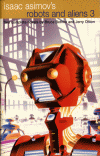One thing I like to do before I review a book is to look up some Wiki pages and other reviews to get a feel for how others reacted to the book. First of all, the Wikipedia entry for this book was no help at all, so much so that I’m considering updating it myself. I’m glad I took some notes while I was reading. I ran across some very harsh reviews on Amazon that had I read beforehand, I might not have picked up this book. Quite a few of the die-hard fans said to read just the first third of the book and stop. After that point, many of the reviewers pointed out that it is fairly obvious that Lindskold deviated from Zelazny’s quick and witty formula.
I, however, loved Donnerjack. It is probably one of my favorite reads in the past few years. About seven years or so ago I enjoyed reading The Great Book of Amber by Zelazny. It was also one of my first exposures to fantasy along with the Wheel of Time by Robert Jordan. Later on I went on to read Lord of Light, also by Zelazny, which I also loved. I’ve also read This Immortal and finally Lord Demon, which is the other book of Zelany’s that Lindskold helped finish. Lord Demon was good, so I didn’t think twice before grabbing Donnerjack. I’ve also not read any Zelazny in the past 3-4 years, so I can’t say I was as aware of the change in writing style as others were. With that said, there was definitely a noticeable difference between Part I and Part II. Thinking back, I would almost say that they could have been split into two different books.
Anyway, I can best describe this book was a very intriguing blend of Sci-Fi, Fantasy, and Cyberpunk themes. Since I’ve read all three of these genres recently, this was a very satisfying experience. I need to start out by giving a little background:
Verité (real world): This is much like our world today, with the exception that tourism has almost entirely shifted to visits to Virtù rather than actual physical destination. A decent percentage of jobs revolve around the maintenance of virtual businesses that are needed inside of Virtù.
Virtù (virtual reality): Picture Virtù as a massive World of Warcraft server, but infinitely more complex. The main difference is that this world wasn’t programmed in detail by humans. From what I gather, the groundwork was a vast network of interconnected systems, which at one point “crashed” in what was called the Genesis Scramble. This is essentially the Big Bang but in electronic form. Out of this massive crash and subsequent reorganization, several hierarchies of AI developed.
People interface with Virtù through intricate VR seats equipped with force fields for bio-feedback, feed tubes for nutrition, allowing visits of weeks or more. Think of these stations like the battery pods in The Matrix, but much more comfortable and people actually choose to use them. People can have avatars that look like themselves, or choose from just about any combination of features imaginable.
The main character for the first part of the book is John D’Arcy Donnerjack, one of three pioneers of Virtu. He fell in love with an AI named Aradys that eventually died. AI in Virtù have life cycles, much like real people. They can reproduce and fall in love. Everything that dies in Virtù is destined for the Deep Fields, ruled by Death. Donnerjack travels to Deep Fields to bargain with Death for the return of his beloved Aradys. Donnerjack agrees to design a master palace for Death, and his first born child. Assuming that reproduction with an AI is impossible, Donnerjack doesn’t consider the implications of the last part of the bargain.
This is where the fantasy part comes in. Death reassembles Ayradys from her fragmented code, but she doesn’t appear to remember fully what she once was. Death instructs Donnerjack to take her along a path that at the end will make her whole again. Somehow when they make it to the end, they cross into Verité, and she is transformed into a real person. They don’t consider that they could possible reproduce, and eventually Ayradys becomes pregnant with a sun. Donnerjack then sets out to protect his son from Death.
The bulk of the novel focuses on Donnerjack’s son. Given the circumstances of his conception, he has a very important role to play. The events I’ve described so far are mostly laid out on the back flap summary. I really can’t go into much more detail without spoiling the plot of the book. This was definitely a page turner for me. I normally just read my books on my lunch breaks, but toward the end I had to take this one home to finish up over the weekend. I highly recommend this book to anyone that has interest in Sci-Fi, Fantasy, or Cyberpunk. If you like more than one of those genres, you’d most definitely be in for a treat.


